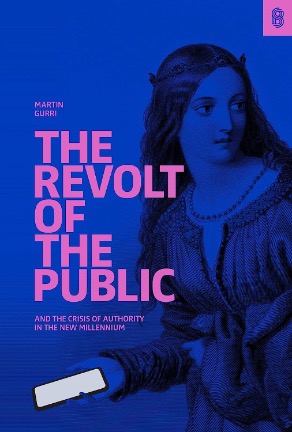Philanthropy
A Conversation with Martin Gurri (Part 1 of 2)
The analyst and author talks to Daniel P. Schmidt and Michael E. Hartmann about philanthropy as an elite institution that should be as “on the defensive” against populist discontent as much as all of the other such institutions that have so ill-exercised their authority.
 Martin Gurri.
Martin Gurri.

Originally published in 2014—so, before Brexit in Europe and before Donald Trump was elected president in the U.S.—former CIA analyst Martin Gurri‘s book The Revolt of the Public and the Crisis of Authority in the New Millennium did a lot of perceptive presaging. It described in detail and insightfully interpreted the public, technology-assisted reactions of ordinary people against the elite, once-respected, industrial-age institutions of the West. It cogently contemplated whether the formerly information-controlling, increasingly distrusted and resented elite class could meet the many challenges of dealing with such discontent and, if so, how.
In The Revolt of the Public, Gurri specifically includes “endowed foundations and other nonprofit organizations” in his list of those elite institutions ill-exercising authority and “clinging to a shrinking monopoly over its field of play.”
Gurri’s prodigious published work since the book, seemingly constantly updated to take into account the most-recent evidence of widening popular discontent, has remained as perceptive and insightful.
In a Discourse article last month, for example, Gurri—who does not consider himself a conservative—astutely examines the future of conservatism, using the now-underway presidential primary as informative context. Discourse is published online by the Mercatus Center, where he is a visiting research fellow, at George Mason University.
“Just as the Democratic Party today is the home of establishment and reaction, Republicans are the party of populism and revolt,” according to Gurri in the piece, “A Heavyweight Match for the Populist Crown.” He then compares and contrasts Trump’s and Ron DeSantis’ different ways of going about being a populist conservative, and seeking to further populist conservatism. In DeSantis’ case, as Gurri sees it, there is a willingness to “unleash[] government in what might be described as a cultural trust-busting exercise.”
In our case, we wondered whether that might include establishment philanthropy—for either DeSantis or any other prominent policymaker or thought leader on the right, for that matter.
The affable Gurri was kind enough to join us for a conversation earlier this month. The almost 13-minute video below is the first part of our discussion; the second is here. In the first part, we talk in general about philanthropy as an elite institution that should be as “on the defensive” against populist discontent as much as all of the other such institutions that have so ill-exercised their authority.
“The elite class, the people who basically run everything in our country, are just remarkably homogeneous,” Gurri tells us. Philanthropic foundations “provide work and an importance, a sense of meaning, for this elite class when they’re not doing other things like running for office or staffing universities and the like” and they “basically move in the same direction when it comes to any kind of social or political issues.
“Foundations today, to most Americans, seem like billionaires flexing their muscles,” according to Gurri.
As an analyst most interested in the “the intersection of media and politics,” by his own description, any deeper examination of goings-on in philanthropy “is just not of interest to the public or has never been made of interest to the public,” Gurri says.
“If all they’re doing is soup kitchens, it shouldn’t be a problem,” according to Gurri. “My question is, what else is going on, right?
“All I’m asking for is that … these institutions be held accountable to public opinion. My sense is if you involve the government, things tend to go bad quickly,” he says. “[O]n the other hand, if you’re spending billions upon billions on what are egregiously political causes … If this was the Democratic party, for example, spending that money, … everybody would know about it and there would be a lot of shouting back and forth ….”
In the conversation’s second part, Gurri talks about philanthropy’s reaction to popular discontent with elites, contemplates the populist future of conservatism, and considers some potential implications of that future for unpopular philanthropy.
This article originally appeared in the Giving Review on July 17, 2023.




